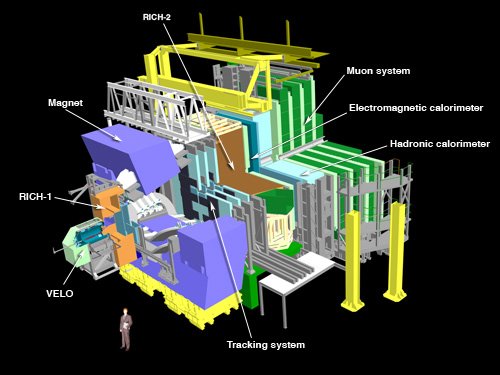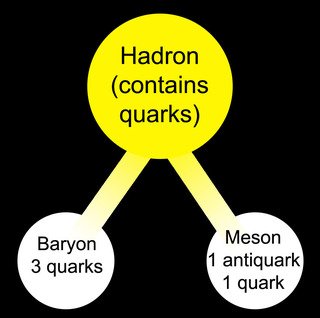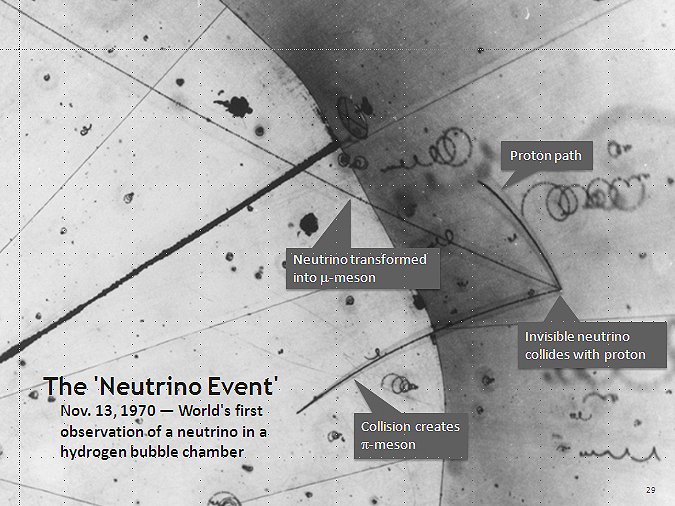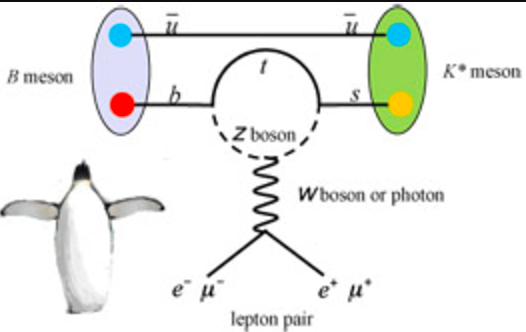The Large Hadron Collider has collected so far a huge amount of data, and this will continue in the next decades. Several experiments are run around the LHC machine, which includes in particular the two general purpose experiments ATLAS and CMS experiments.
These are denoted as general purpose experiments because they are targeting the discovery of new phenomena in a very broad sense. However, nothing is observed in data so far.

[image credits: LHCb @ CERN]
There are however other experiments around the LHC, one of them being the LHCb experiment, whose detector is schematically represented on the right.
This experiment has observed unexpected hints for new phenomena that cannot be explained in the context of the Standard Model of particle physics.
Although we cannot claim any discovery yet, these hints are well admitted today.
This post is the follow-up of this earlier post of mine where I introduced LHCb and flavor physics. The new phenomena that I will discuss are indeed connected to flavor physics and LHCb.
QUARKS AND HADRONS
All the observed flavor anomalies are connected to B-mesons, D-mesons and kaons. And how better start a post as with nice names? I don’t know. But I will… go back to the basics first: quarks and hadrons.
As I explained it in a post I wrote almost a year ago on Steemit (yes, it is almost a year I am around! Time flies), there are several elementary particles and some of them are called quarks.
Quarks are particles sensitive to the strong interactions and their dynamics (or the way they behave) is dictated by quantum chromodynamics, or QCD in short.
The strong interaction is so strong (yep the naming ‘strong’ is not random… there is something behind) that it allows quarks to form bound states generically named hadrons.
Although there are six quarks in nature, only five of them contribute to the formation of bound states: the up, down, strange, charm and bottom quarks (the top quark decays before being able to do anything else).

[image credits: FNAL]
There are several classes of bound states, or hadrons, and they differ according to the underlying quark/antiquark structure. We have, for instance, baryons and mesons to name the most well known.
Each baryon is made of (roughly) three quarks (or three antiquarks), and the best representative of this class of (composite) particles are definitely the neutron and the proton.
The bound states that I am interested in today are named mesons and they are made of one quark and one antiquark. The properties of some of them, studied in details by the LHCb experiment, exhibit disagreement with the Standard Model.
Before detailing what is going on with these mesons, I would like to emphasize that other more exotic bound states exist too. They are named tetraquarks (2 quarks and 2 antiquarks) and pentaquarks (4 quarks and 1 antiquark).
They interest high-energy physicists a lot, in particular as the LHCb experiment (again ;) ) has discovered some of them during the last three years. More information is available here for those interested.
Finally, it is interesting to mention that hexaquarks could also exist, in principle. While the theory is there, these beast have not been observed so far (even in LHCb).
B-MESONS, D-MESONS AND KAONS
All the anomalies I want to talk about are related to specific mesons: heavy flavor mesons. But what are those guys?
These particles are composite systems, as said above, made of exactly one quark and one antiquark.

[image credits: Wikipedia]
For instance, the most well-known mesons are the pions. They played, for instance, a key role in the discovery of the neutrino, as shown on the picture on the right.
This picture represents tracks of particles in a bubble chamber, and the properties of the various tracks allow physicists to understand what happened in this reaction. The lowest track in the picture, right in the middle of it, is the one of a pion.
Pions consist of systems made of the lightest flavors of quarks (up, down) and they can be electrically neutral or positively or negatively charged (depending on their quark/antiquark content). This comes from the fact that up-antiup or down-antidown pairs are neutral, up-antidown and down-antiup are respectively positively and negatively charged.
Now, let us go back to the topic. Mesons can also be made of heavier quarks like strange, charm or bottom quarks. Those are respectively named kaons, D-mesons and B-mesons.
B-mesons were in particular scrutinized by the LHCb experiment that study their properties very deeply to understand better how the matter-antimatter asymmetry could come from.
FLAVOR ANOMALIES IN B-MESON DECAYS TO KAONS
Now, what about these anomalies?

[image credits: Belle @ KEK]
The first channel where something weird is happening consists in the study of the decay of a B-meson into a kaon and a pair of electrons or a pair of muons.
Also known as a penguin decay. Now you got the title of the post :)
Those decays are rare, and the Standard Model predicts that one should see as much decays into a kaon and an electron-positron pair as decays into a kaon and a muon-antimuon pair.
We are dealing with something called lepton universality: electrons/positrons or muons/antimuons should not make any difference.
LHCb is however observing much more electrons than muons. The number of muons is actually of about 3/4 the number of electrons. The chances for this to be a fluctuation are actually of about 1 in 100.
This is why we are talking about an anomaly and not an evidence (at least yet): This number is still not small enough.
Moreover, those hints persist when we investigate different kaon species! Combining everything, we get a probability for a fluctuation equal to one chance out of 15.000… Still not enough to claim a discovery, but… We start to be close!
A similar effect is observed when the B-mesons are decaying into another strange meson (a meson made of strange quarks) called the phi. Damned: two hints now…
FLAVOR ANOMALIES IN B-MESON DECAYS TO D-MESONS

[image credits: Quantum diaries]
But the story does not end there: B-mesons can also decay into a D meson, a charged lepton and a neutrino. A diagram showing what is going on when a tau lepton is involved is shown on the right.
LHCb has measured the rates when the lepton is a tau, and when it is an electron or a muon. Again, a deviation with respect to the predictions is observed, at the same level as before!
On top of that, it is good to remember that the earlier BaBar experiment at Stanford has recorded some of these anomalies too, but in a more confuse way (due to less data).
TAKE-HOME MESSAGE AND REFERENCES
One of the important message of this post is that the LHCb experiment at the LHC at CERN has made crucial and important observations during the last few years. I am not only talking about the tetraquark and pentaquark business (that I may discuss in another post), but I am actually referring to the so-called flavor anomalies in the decay of B-mesons.
There are real processes named penguins in flavor physics, and the corresponding Standard Model predictions do not seem to agree with data… Other processes involving charmed mesons are also showing hints for unexplained stuff.
To make a long story short: lepton universality seems really to be in a bad shape… But we need more data to draw any conclusive statements.
To get more information on this topic, I recommend the following links:
- One can find more information on these excesses on the LHCb publication webpage.
- A good summary of the excesses (with links to the exact publications) can be found in this article and the references there in.
One can clearly tell that you are living the dream. Keep up the good work. :-)
Kind of. This is not how I was expecting new phenomena to show up. but well... nature is what it is ^^
Such a TOP Topic is Presented in So Simple Way to be understood... Great post for the interested people ... loved @cWorldV99 !!!
Quality post @lemouth.
P.S. no evidence of supersymmetry, yet? Come on! ;)
This is not my fault if nature is not nice with us ;)
this is a mind boggling device humans have created! and great read thanks!
Hola Mr. I have not been upping almost no-one last few days because I must recharge SP over 90%. It went to 14% few days ago and can't use the slider atm. Will up you and everyone soon. I'm sorry about it.
Don't worry @logic, I have been through there too (now I am a bit better, with an adjusted voting strategy ;) )
To tell you everything, CERN makes me very afraid. I'm afraid that he will discover something that can not be mastered and that will destroy the earth. In any case your article is very interesting I like science and your explanations are simple. Thank you
i live a few kilometers from it; pretty scary :D
Me too, in the east of France
haha let's pray nothing bad happens ;)
Don't worry :)
Are you referring to the black hole story? Because there is nothing to fear from that. In terms of operation, there is no danger for anyone. There were security studies (that are public and available... but I don't have them right here so that google may need to be called for help to get them :p ).
I have heard of this theory that man, as an Observer of the process, can have a significant impact on what is happening. How do you think the fact that the number of electrons more muons in the experiment with the Collider can be attributed to the Observer effect?
I am not really understanding the questions. I will interpolate and try to answer something. Please come back to me if necessary. The theory behind relies on the quantum world, which means that many results are possible when one single collision occurs. However, when billions of collisions occur, we can start using statistics to dig into the results and identify the signals that we are after with a very good accuracy. In all error associated with the measurements, there is always a statistical component related to this. Therefore, this is well accounted for when a claim for an excess is made.
I hope it helps :)
There is a theory that the result of the observation depends not only on external factors, but even from what people watching the experiment. From his expectations too. These cognitive distortions also cause for some error in the analysis of the obtained data. Therefore, different scholars, conducting one and the same experience, can receive different numbers.
Let's wait for the completion of the experiment with the Collider. Will see what happens=))) (sorry for my bad English)
That's not how it works though
But how?
The only effect we have on quantum mechanics comes from our tools, its not our mind.
Everything can be...
Actually, you may be trying to apply a theory (quantum mechanics() that works at the microscopic level to the macroscopic one. Observations are indeed acting on the nature of the system.
Although here it is valid at the microscopic level (the hard process of the collision obeys to the laws of the quantum world), when we are far enough from the collision point (where the detectors are), those effects are not there anymore.
However, this is true that the results of each collision will be different. As I said before, this is why we need to repeat it a lot :)
I agree with You, @lemouth=))) have a wonderful Pushkin poem. It seems contemporary, though written over a hundred fifty years ago.
The translation is not very good. The other is not found
:)
@lemouth Thanks for sharing an overview.
Any data on what are the affects the various LHC's and the VLHC's worldwide ... and if they could be linked or interlinked?
There is actually only a single LHC worldwide, and there is not any VLHC so far (although this is actively discussed by high-energy physicists). So that there is no answer to your question, I guess :)
I could have phrased the question more precisely however this is merely over-view and brief comment - and precision engineering notation wasn't my focus when considering nondisclosure agreements; so the sites with Superconducting Super Collider (SSC); sites with powerful magnetic field to confine plasma (such as the nearby I.T.E.R.); and other powerful field experiments is a unknown potential.
Sigh...
Aaaah ok now I got it. The SSC project was actually abandoned long ago (before my time) and there is thus no data there (for the reason there is just no experiment at all). Concerning ITER, we are handling nuclear fusion and are thus talking about different scales, purposes, etc...
The closest machines we can compare the LHC with are the Tevatron collider (close to Chicago and that was shut down few years ago) and the former CERN machine LEP. The data of these two experiments are consistent with the LHC. They were not capable to probe the anomalies I am mentioning here.
There were on the other hand experiments dedicated to flavor physics, like BaBar (Stanford) or Belle (in Japan) and the results are consistent with the LHC findings.
I hope this helps :)
You didn't list the Higgs Factory (China's supercollider, but they claim it will operational in 2020 and I heard about something in Antarctica)...
The many projects worldwide (regardless of stated purposes and operational status) could have undesired consequences - consider this simple example: wife turns on kitchen's blender and down the hall three rooms over the TV news is scrambled.
With the shieldings and underground locations I don't expect these massive projects to be interfered with, but what about the potential affects on nearby energy fields that make up the ambient environment and life?
I imagine this is a mute question with your colleagues, discussions about unintended consequences are dismissed with assurances of the many precautions, but with so many worldwide projects not communicating to each other as a safety precaution (to protect human, farms, ambient enviro) this is added complexity with potential hazards.
Consider my comment a cautionary reminder - discuss right and wrong, and ask for other projects' "undisclosed" operations at least for safety concerns.
The Chinese option for a Higgs factory is among the future collider projects being currently discussed by high-energy physicists. It is not clear yet this will be ever built, and if it will be built in China. CERN is an option too. Again, no data as this is not existing yet.
There is no accelerator project in Antartica to my knowledge (at least from a particle physics standpoint). In contrast, several neutrino/dark matter experiments are relevant for this part of the world.
I can ensure you that safety measures have been taken so that for all the projects, there is no risk for the surrounding people. Shielding, etc... All of this has been studied, and all the studies are public (probably on the CERN website for the LHC, and I don't have direct links to share... I guess google can help if you want to have a look).
This being said, too much radiation would also damage the detectors which lie much closer to the beams than mister and miss everybody. I don't know if this will convince you that all of this is safe, but this may be a further starting point for discussing ;)
;)
Great article, the Higgs boson was also finally a proven theory because of CERN so it is successful in so many ways.
Just to be slightly more precise, if you allow me: the Higgs boson itself is not a theory, but is actually a component of the so-called Standard Model of particle physics. This was for a long time the missing link that has indeed been found in 2012 at CERN. I was lecturing students on that day (and I thus missed the champaign) :)
This is very detailed and well put together. What did you use to generate this post as far as formatting goes?
I used my favorite text editor, called 'vi', plus few HTML tags :)
Ah okay. Did you know your way around HTML before starting or would you recommend just buying the bullet and picking it up? (Already familiar with vi/vim)
I know HTML since my teenager time so that I didn't have anything to learn here. Therefore, I cannot really help. However, if you tell me what you want to do, I can help and share a snippet of code ;)
Finding something that cant be explained by standard model is always exciting and scary at the same time... It could mean we have everything wrong so far, or it could mean a new understanding of the universe... Cant wait for any definitive discovery :D
The Standard Model is not wrong, in the sense that it works extremely well to describe all the phenomena observed so far. However, there are issues that make us believe that it consists only of the tip of a huge iceberg that we need to discover. The violation of lepton universality may be a way to get under the tip :)
In short, even if the ultimate theory is not the Standard Model, in the low energy limit that has been probed so far, the ultimate theory will be identical to the Standard Model.
I recommend maybe this post of mine if you are interested by the reasons to go beyond the Standard Model :)
CERN is fascinating. But I wonder if we should be meddling with this stuff
Why shouldn't we? :)
We got no idea what the possible results may be.
Well, we now at least a part of them. The rest is just a matter of understanding how the universe works. This can't hurt, no?
I really can't answer that question. I got way more questions then answers my friend :) haha
I am not commenting much lately on your posts even if I read them. Truth is, i have no fucking clue what you are saying most of the time and I just try to piece things together.
Oh... I am however trying to put it clearly enough so that anyone could follow. Feel free to ask for clarifications. I would be more than happy to do so (possibly in the chat if you prefer) :)
I must admit that there are so many posts at the moment that I am missing many many posts and that I haven't read many of your posts at the moment I remember one of them I wanted to interact, but then I didn't find the time... I will try to make an effort in the future! I promise!
lol. no man. you don't have to. I am just saying that these are complicated things. I have my own ..issues..with cosmology and physics and I am quite skeptical. that's all. you explain it perfectly. don't worry.
also you don't have to read my rants :)
Well, even if you rant, we can still debate as adults (jsut a good old discussion, but without the beer) ;)
always
Whenever I hear of news of "new phenomena" discovered by LHC, I get super excited. I can't wait for us humans to finally crack the elusive theory of everything. I hope we can do it in my own lifetime ;)
I wish to witness some discovery of any kind too (even if it is not the ultimate theory... I can be happy with little :p )
I'm so glad people are interested in science. Love it! Thanks!
per favoré
per favoré
per favoré
per favoré
interesting article, thank you
I don't really enjoy science , but this is something new to me lol, guess we learn something new everyday !
This is soo insightful...thanks for sharing your knowledge with me
it's a realy great post thank you for sharing it with us keep up the good work
Really enriching. I love to follow physics evolution as it draws nearer to the nature of reality only to find that the rabbit hole goes deeper. Resteemed :)
i think im in the wrong post!??!
I beg your pardon?!
Excuse me, it was a joke! I was interested to read this article as Im interested in this topic... but upon glancing at the post i realised i couldn't understand a word of it!
Oh really? Which part exactly? You are the second one saying that it is too complicated. I may make it clearer. Actually, I would be happy to make it clearer. Just let me know where things are starting to get messy and we can start from there.
i would love to normally help out but i really must stop as its somehow become 01:29 in my timezone.
Ill pickup tomorrow or very soon thereafter!
best of luck!
Okidoo! Thanks!
I will write a prequel post soon, in fact ;) It may be necessary (I assumed things I wrote long ago are still remembered, but this is not the case mainly because new users have appeared and old users have disappeared).
ok.. you konw im not really at all conversant in this language, but i do have a solid science background mainly in biology and biochem etc. It MIGHT be good to have an initial 'non tech' synopsis that explains in simple language what the point and implications are of the post. Then if you are able you can then read the rest of the post.. At least for me, that would be nice!
I appreciate this is a highly complex subject that is seemingly very difficult to discuss in plain language, but im sure with some imagination it can be done..
It's easy. See my comment to this article.
This post received a 3.2% upvote from @randowhale thanks to @lemouth! For more information, click here!